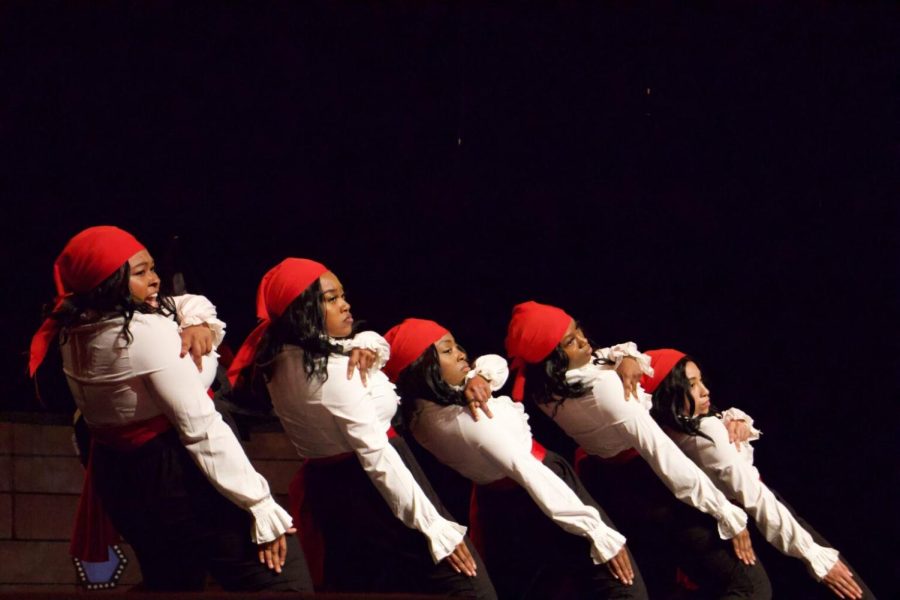Canceling tradition to prevent appropriation
Photo courtesy of Jabari Blake Richardson
The Ladies of Delta Sigma Theta Sorority perform at Howard University Homecoming Greek Step Show 2021.
October 12, 2022
Less than two weeks before its kickoff, an email from Homecoming Co-Chairs, senior Isabelle Jordan and junior Jared Slusher, was sent to the student body of Augustana College to announce the cancellation of Yell, a homecoming tradition. The decision was made deliberately following the arguments that were brought up by the cultural groups on campus.
In the email, Jordan and Slusher acknowledged the “problematic history Augustana has perpetuated over the years regarding the cultural significance of Step and Drill.” According to Step Afrika, Step dates back to the 1900s. Stepping is a percussive dance developed by African-American fraternities and sororities, in which the performers use their bodies as instruments, while singing uplifting songs about their own group. Augustana’s Greek organizations found inspiration from Step to develop its own Yell routine, yet Augie’s students of color soon found it turning into cultural appropriation.
Junior Naya Allen, Vice President of Black Student Union, commented on the similarity Augie Yell has compared to traditional Step.
“I looked into the history of Augustana’s Yell, and originally it was just a series of chants, claps and stomps,” Allen said. “However, over time, those stomps and claps turned into a series of steps that look very similar to the traditional Step styles and patterns that you see at HBCUs, the Step that is done by organizations of the Divine Nine, which are the first nine African-American fraternities and sororities.”
Complaints were first brought to the Homecoming Chairs by senior Andrew Leon-Sanchez, Captain of Augustana Step Team, who considers the incorporation of Step into Yell as a form of cultural erasure.
“There is this list of rules that are completely whitewashing what Step truly is,” Leon-Sanchez said. “You have rules where you’re forcing people to cheer each other on. You force them to provide a script of exactly what needs to be said. You fine people for not following these certain rules that are clearly erasing what Step is, which has historically been a form of protest, and then perform it as a means of entertainment. You’re changing its name completely and calling it something else.”
For some Greek groups on campus, Yell is a part of their constitution. Senior Amber Johnson, President of the Chi Omega Gamma, surveyed her members over the summer and the sorority decided to not participate in this year’s Yell, effectively repealing against their own tradition.
“Members from our group called out the departments that are responsible for the event for not doing enough due diligence to make sure the event is inclusive, and that whatever training we have won’t suffice for us to perform Yell,” Johnson said. “I’m glad the Office of Student Life is taking an official stand against what is essentially a cultural appropriation event.”
Slusher and Jordan had a meeting with representatives from different groups who came forward to voice their concerns and opposition towards Yell. Ultimately, they decided to cancel the traditional homecoming activity and replace it with an informational meeting to educate people on the history of Step and Yell.
“Yell was canceled two years ago for similar reasons that it was canceled this year,” Slusher said. “Isabelle and I had a chance to sit down and talk with leaders of different cultural groups who educated and shared their opinions with us. We’re going to host a presentation to explain the reasons we canceled yell and the importance of understanding Step culture and where it comes from.
The Step team will perform for those in attendance, to show off what Step really means.
“The Augustana Step team would also perform this year in place of yell,” Slusher said. “As said in the email, at the end of the day, a two minute performance is not worth perpetuating centuries of cultural appropriation and discrimination.”
The opportunities for yell to return in the future is left open, as long as a complete revamp takes place.
“There is a plan to bring the event back and have it be something completely different,” Slusher said. “When Yell was first started, it was more similar to a cheer competition. So we want to bring that back while not taking the moves and choreography from Step culture because it wasn’t ours to take.”











































































































